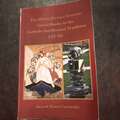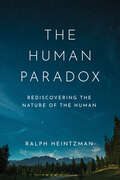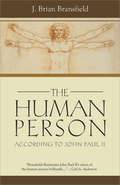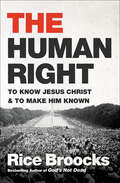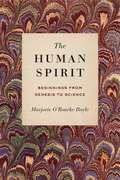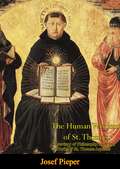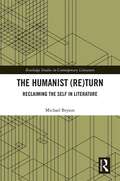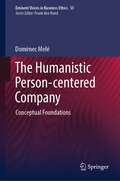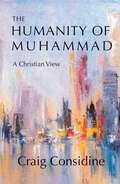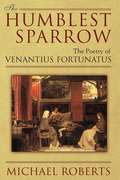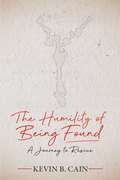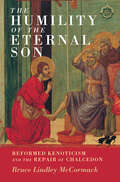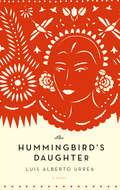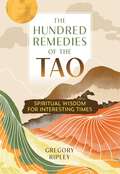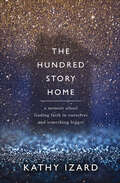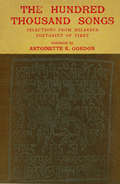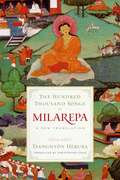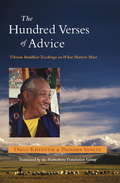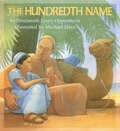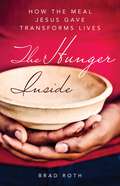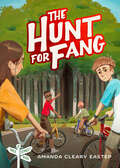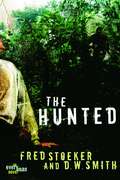- Table View
- List View
The Human Journey Seminars: CIT 201
by Sacred Heart UniversityThe Human Journey Seminars - Catholic Intellectual Tradition
The Human Paradox: Rediscovering the Nature of the Human
by Ralph HeintzmanWhat is a human being? What does it mean to be human? How can you lead your life in ways that best fulfil your own nature? In The Human Paradox, Ralph Heintzman explores these vital questions and offers an exciting new vision of the nature of the human. The Human Paradox aims to counter or correct several contemporary assumptions about the nature of the human, especially the tendency of Western culture, since the seventeenth century, to identify the human with rationality and the rational mind. Using the lens of the virtues, The Human Paradox shows how rediscovering the nature of the human can help not just to understand one’s own paradoxical nature but to act in ways that are more consistent with its full reality. Offering accessible insight from both traditional and contemporary thought, The Human Paradox shows how a fuller, richer vision of the human can help address urgent contemporary problems, including the challenges of cultural and religious diversity, human migration and human rights, the role of the market, artificial intelligence, the future of democracy, and global climate change. This fresh perspective on the Western past will guide readers into what it means to be human and open new possibilities for the future.
The Human Person
by Brian J. BransfieldIn the 20th Century three social revolutions--the industrial, sexual, and technological revolutions--challenged the religious convictions of many. John Paul II's teaching on the theology of the body was his response to the resulting societal shifts. Fr. Bransfield explores John Paul II's response to the challenges raised by these revolutions. In this context Bransfield then explores how Theology of the Body leads us to live the fullness of the Christian life.
The Human Right: To Know Jesus Christ & to Make Him Known
by Rice BroocksA case for making the proclamation of the Gospel our highest priority, from the bestselling author of God’s Not Dead.Is there a human right greater than all others?Many Christians believe we need to choose between fighting injustice and communicating the good news of Jesus Christ. But what if failing to speak the truth is ultimately the greatest injustice of all? If we truly believe the human heart is the source of injustice and the gospel is the only real solution, shouldn’t sharing the gospel’s transforming truth be our highest priority?With his thoughtful, accessible style, Rice Broocks explores why knowing the gospel is, in fact, every person’s greatest right—and therefore the greatest justice issue of our time. In The Human Right, he draws on contemporary stories and rich historical sources to:· answer the question, What is truth?· frame evangelism as a human rights issue· explain why secularism lacks the foundation to ground human rights· give evidence for the existence of the human soul· describe how the Bible has shaped the modern worldThe Human Right urges us persuasively toward a renewed conviction that our ultimate calling is to proclaim the gospel—the only truth that has the power to change our world, to change us, from the inside out.
The Human Spirit: Beginnings from Genesis to Science
by Marjorie O’Rourke BoyleIn this volume, Marjorie O’Rourke Boyle probes significant concepts of the human spirit in Western religious culture across more than two millennia, from the book of Genesis to early modern science. The Human Spirit treats significant interpretations of human nature as religious in political, philosophical, and physical aspects by tracing its historical subject through the Priestly tradition of the Hebrew Bible and the writings of the apostle Paul among the Corinthians, the innovative theologians Augustine and Aquinas, the reformatory theologian Calvin, and the natural philosopher and physician William Harvey. Boyle analyzes the particular experiences and notions of these influential authors while she contextualizes them in community. She shows how they shared a conviction, although distinctly understood, of the human spirit as endowed by or designed by a divine source of everything animate.An original and erudite work that utilizes a rich and varied array of primary source material, this volume will be of interest to intellectual and cultural historians of religion, philosophy, literature, and medicine.
The Human Spirit: Beginnings from Genesis to Science
by Marjorie O’Rourke BoyleIn this volume, Marjorie O’Rourke Boyle probes significant concepts of the human spirit in Western religious culture across more than two millennia, from the book of Genesis to early modern science. The Human Spirit treats significant interpretations of human nature as religious in political, philosophical, and physical aspects by tracing its historical subject through the Priestly tradition of the Hebrew Bible and the writings of the apostle Paul among the Corinthians, the innovative theologians Augustine and Aquinas, the reformatory theologian Calvin, and the natural philosopher and physician William Harvey. Boyle analyzes the particular experiences and notions of these influential authors while she contextualizes them in community. She shows how they shared a conviction, although distinctly understood, of the human spirit as endowed by or designed by a divine source of everything animate.An original and erudite work that utilizes a rich and varied array of primary source material, this volume will be of interest to intellectual and cultural historians of religion, philosophy, literature, and medicine.
The Human Wisdom of St. Thomas: A Breviary of Philosophy from the Works of St. Thomas Aquinas
by Josef PieperJosef Pieper has attached no commentary to the texts brought together in this breviary of the philosophy of St. Thomas, preferring that the reader should encounter them, “on his own”. His work has been one of selection, in which he has sought to assemble such passages as will provide an introduction to the form and design of the whole Thomistic system. Yet he has so ordered his texts as to impress upon the reader a special feature of St. Thomas’s thought, what he calls its double aspect: St. Thomas sees the whole scheme of reality ordered and penetrable by reason; yet the mystery of Being itself remains: “The effort of human thought has not been able to track down the essence of a single gnat.”Josef Pieper, one of the most highly regarded Thomistic philosophers of the twentieth century, wrote numerous philosophical works including Leisure: The Basis of Culture, Guide to Thomas Aquinas, Only the Lover Sings and many more.
The Humanist (Routledge Studies in Contemporary Literature)
by Michael BrysonThe exciting new book argues for a renewed emphasis on humanism--contrary to the trend of post-humanism, or what Neema Parvini calls "the anti-humanism" of the last several decades of literary and theoretical scholarship. In this trail-blazing study, Michael Bryson argues for this renewal of perspective by covering literature written in different languages, times, and places, calling for a return to a humanism, which focuses on literary characters and their psychological and existential struggles—not struggles of competition, but of connection, the struggles of fragmented, incomplete individuals for integration, wholeness, and unity.
The Humanistic Person-centered Company (Issues in Business Ethics #55)
by Domènec MeléHumanism in business is not only an alternative to economism but a way to human excellence. Humanism presented here revolves around the rich notion of “human person”, keystone of modern personalist philosophy and Catholic Social Teaching. From this perspective this book is offered to everyone, believer and nonbeliever alike. The person-centered humanism considers the human-wholeness, individual and relational, with subjectivity, self-determination, openness to transcendence, and with capacity not only to possess but also to give. It also highlights the uniqueness of each person, endowed with a high constitutive dignity and in continuous process of flourishing toward human plenitude. An attitude of respect and good will is due to non-personal beings, while persons deserve to be treated with justice and even with love of benevolence. The book is prepared in dialogue with mainstream of thought in business and business ethics and focused on exploring ways to improve some conventional views. It includes some proposals such as a person-based ethics, ethics understood as intrinsic to business activity, the consideration of the company as an organized community of persons, and the purpose of the company oriented toward the common good through a double mission, internal and external. It is also suggested substituting the notion of “stakeholder” for the richer one of “relationholder.”
The Humanity of Muhammad: A Christian View
by Craig ConsidineWhat makes an American Catholic of Irish and Italian descent one of the leading global voices in admiration of Prophet Muhammad? In this overview of Muhammad's life and legacy, prominent scholar Craig Considine provides a sociological analysis of Muhammad's teachings and example. Considine shows how the Prophet embraced religious pluralism, envisioned a civic nation, stood for anti-racism, advocated for seeking knowledge, initiated women's rights, and followed the Golden Rule. Considine sheds light on the side of Prophet Muhammad that is often forgotten in mainstream depictions and media narratives. The Humanity of Muhammad is Considine's contribution to the growing body of literature on one of history's most important human beings.
The Humblest Sparrow: The Poetry of Venantius Fortunatus
by Michael RobertsA long-awaited study of the poetry of Venantius Fortunatus
The Humility of Being Found: A Journey To Rescue
by Kevin CainThe need to be rescued is somewhat about personal incompleteness and mostly about God, who desires to have loving communion with creation. Spiritual rescue follows a simple pattern: Messiah is lovingly sent to rescue; each has a tendency to fight against the Rescuer; personal humility is a statement of faithful surrender and the key to being found; the greatest journey of rescue is Jesus Messiah&’s upper room to empty tomb victory over sin and death; now rescued, the individual&’s only responsibility is to bear the Christ Who bears our wounds. Such is the journey to rescue.In The Humility of Being Found: A Journey To Rescue, Kevin B. Cain writes, &“Please acknowledge deep within every soul there is division from and longing for communion with the One larger than ourselves and with brothers and sisters in the struggle of life. Every division requires rescue, and the eternal estrangement of people from the God Who loves them necessitates the greatest of rescues. And, so, whether we realize or not, each of us sets out on a journey to discover rescue. Thousands of years ago, Messiah did the same. God descended into a journey, not to be rescued, but to offer rescue. The apostle, Paul, says Messiah&’s journey to rescue each of us can be summed up in three words: death, burial, and resurrection. Whether the individual&’s journey to be rescued is active or passive, Jesus&’ journey of death, burial, and resurrection has brought rescue to all. You are now being invited to enter thirty-six hours from my personal journal. In the pages that follow, you will read my chronicling of Jesus&’ Upper Room to empty-tomb journey of rescue and my attempt, through vigil, to journey alongside creation&’s Rescuer. In the written testimony of my journey to be rescued and my stumbling over the Messianic leaf of God&’s rescue that follows, perhaps you too will stumble, welcome rescue, and rise.&”
The Humility of the Eternal Son: Reformed Kenoticism and the Repair of Chalcedon (Current Issues in Theology #18)
by Bruce Lindley McCormackThe Chalcedonian Definition of 451 never completely resolved one of the critical issues at the heart of Christianity: the unity of the 'person' of Christ. In this eagerly-awaited volume - the result of deep and sustained reflection - distinguished theologian Bruce Lindley McCormack examines the reasons for this philosophical and theological failure. His book serves as a critical history that traces modern attempts at resolution of this problem, from the nineteenth-century Lutheran emphasis on Kenoticism (or the 'self-emptying' of the Son in order to be receptive to the will of the Father) to post-Barthian efforts that evade the issue by collapsing the second person of the Trinity into the human Jesus - thereby rejecting altogether the logic of the classical 'two-natures' Christology. McCormack shows how New Testament Christologies both limit and authorize ontological reflection, and in so doing offers a distinctively Reformed version of Kenoticism. Proposing a new and bold divine ontology, with a convincing basis in Christology, he persuasively argues that the unity of the 'person' is in fact guaranteed by the Son's act of taking into his 'being' the lived existence of Jesus.
The Hummingbird's Daughter: A Novel
by Luis Alberto UrreaFictional account of the author's cousin. She was known as the Saint of Cabora the Mexican Joan of Arc, and the Patron Saint of the Yaqui Indians. Born illegitimate daughter to the Patriarch of the Urrea ranch, During her life s he was beaten, imprisoned, and nearly killed. Seeming to rise from the dead, she was attributed with powers of healing, and other miracles, and is still revered today in parts of Mexico.
The Hundred Remedies of the Tao: Spiritual Wisdom for Interesting Times
by Gregory RipleyA new translation of the 6th-century Taoist text Bai Yao Lu (Statutes of the Hundred Remedies), with practical commentary• Explains how the Hundred Remedies of the Bai Yao Lu offer a practical guide to what enlightened or sagely behavior looks like• Shows how each short verse of the Hundred Remedies presents a spiritual precept as a solution to the problems encountered in daily life and on the spiritual path• Provides insightful commentary for each of the Hundred Remedies, showing how they relate to meditation practice and can help us navigate emotional and social challengesIn modern Taoist practice, the emphasis is often on &“going with the flow&” (wu-wei) and not following any fixed rules of any kind. This may work well for an already enlightened Taoist Sage, but for the rest of us, following a spiritual path involves ethical, moral, and practical guidelines. As author and translator Gregory Ripley (Li Guan, 理觀) explains, the little-known 6th-century Taoist text called the Bai Yao Lu (Statutes of the Hundred Remedies) was created as a practical guide to what enlightened or sagely behavior looks like—and each of the 100 spiritual remedies are just as relevant today as they were when written over 1500 years ago.Presenting a new translation of the Bai Yao Lu for the contemporary world, Ripley provides insightful commentary for each of the Hundred Remedies, showing how they relate to Taoist meditation practice and how they can help us navigate the emotional and social challenges we all experience. He explains how each short verse of the Hundred Remedies presents a spiritual precept in a positive way, not as a restriction or commandment that must not be broken but as a solution to the problems encountered in daily life as well as on the spiritual path. He shows how these deceptively simple statutes, known as abstentions in Taoism, teach us how to emulate the behavior of the Sages until the behavior becomes our own.Both scholarly and inspirational, this guidebook to Taoist spiritual living will help you learn to effortlessly go with the flow, deepen your meditation practice, and find the natural balance in all things.
The Hundred Story Home: A Memoir About Finding Faith in Ourselves and Something Bigger
by Kathy IzardWhat if you just trusted the whisper of calling placed on your heart?Kathy Izard was volunteering at Charlotte&’s Urban Ministry Center when an unlikely meeting with a homeless man changed the course of her life. She realized that serving at the soup kitchen was feeding her soul, but not actually solving the needs of the homeless population.Rather than brush it off and avoid what she now felt called to take on, she quit her job and took on what seemed like an insurmountable task—building housing for Charlotte&’s homeless.Woven together with this uplifting story of social action is Kathy&’s personal struggle with faith, forgiveness and fulfillment. In telling her story, Kathy invites you to consider rewriting your own.What&’s calling you? As crazy at it seems, it may be crazier not to try. This book will push you to do so much more than you ever thought possible.
The Hundred Thousand Songs
by Antoinnette K. GordonThis collection of Tibetan poetry and lyrics is accompanied by extensive commentary and offers a great insight into a rich literary culture.Tibet, remote and inaccessible, is less known to the western world for its literary than its artistic contributions to world culture. Nevertheless, it has produced a literature of enduring beauty and significance, the supreme achievement of which is the poetry of Milarepa, its greatest poet and saint.This Tibetan poetry book indicates in its poetic exaggeration that, to the Tibetans, his poetry contains all earthly and celestial wisdom. It is from this masterpiece that the selections for the present volume have been made-songs in which Milarepa describes his life in the solitude of mountain glaciers, his yogic attainments in self-discipline, his encounters with demons who try to obstruct his meditations, and his arrival at enlightenment and spiritual freedom.Presented here in skillful translation-in a volume decorated with original Tibetan woodcuts and motifs from Tibetan art-these poems shiningly reflect the genius of Tibet's "Old Man, Storehouse of Songs."
The Hundred Thousand Songs of Milarepa: A New Translation
by Tsangnyon Heruka Christopher StaggAn authoritative new translation of the complete Hundred Thousand Songs of Milarepa, the teaching songs and stories from Tibet's most beloved Buddhist yogi, poet, and saint. Powerful and deeply inspiring, there is no book more beloved by Tibetans than The Hundred Thousand Songs, and no figure more revered than Milarepa, the great eleventh-century poet and saint. An ordinary man who, through sheer force of effort, faith, and perseverance, overcame nearly insurmountable obstacles on the spiritual path to achieve enlightenment in a single lifetime, he stands as an exemplar of what it is to lead a spiritual life. Milarepa, a cotton-clad yogi, wandered and taught the dharma, most famously through spontaneously composed songs, a colorful and down-to-earth way to convey the immediacy and depth of the Buddhist teachings. In this work, the songs are woven into a narrative that tells the stories of his most famous encounters with his students, including Gampopa and Rechungpa, and recount his victories over supernatural forces in the remote Himalayan mountains and caves where he meditated.In this authoritative new translation, prepared under the guidance of Dzogchen Ponlop Rinpoche, Christopher Stagg brilliantly brings to life the teachings of this extraordinary man. This classic of world literature is important for its narrative alone but is also a key contribution for those who seek inspiration for the spiritual path.
The Hundred Verses of Advice: Tibetan Buddhist Teachings on What Matters Most
by Dilgo Khyentse Padama SangyeThis commentary on Padampa Sangye's classic verses of advise to Tibetan villagers of Tingri--by renowned and beloved meditation master Dilgo Khyentse--offers guidance for people trying to lead a dharmic life in the workaday world. These hundred verses, studied for centuries by Tibetans and students of Buddhism, contain a complete survey of the Tibetan Buddhist path. Dilgo Khyentse's lively explication of each stanza brings to light subtleties and amplifies the richness of the words and their pertinence to our lives. These two venerable teachers advise us in relating to everyday difficulties such as loneliness, craving, family squabbles, competition in business, disagreements with neighbors, and betrayal by friends--as challenging to us as they have been to meditators for centuries.
The Hundredth Name
by Michael Hays Shulamith Levey OppenheimSalah, a boy living in Egypt, wants to lift his camel's sadness, so he prays that the camel will learn Allah's hundredth name, which is unknown to man. Image descriptions present.
The Hundredth Name
by Shulamith Levey OppenheimThis picture book for young readers, rich in the details of Middle Eastern village life, tells the warm story of a bond between a father, a son, and the son's favorite camel, as well as their devotion to the Muslim faith, and the power of prayer in their daily life. Salah and his camel, Qadiim, are constant companions. They work together, eat together, and sleep together. Salah is distressed, however, because his camel always seems so sad and downcast, hanging his head low. But in middle of one night, Salah remembers what his father has told him -- that while mankind knows only ninety-nine names for Allah, there are actually one hundred names. What if Qadiim, the camel, could learn the hundredth name? Under the stars Salah prays "to Allah with all his strength." The next day-- a seeming miracle! -- the camel Quadiim carries his head high with a most knowing look. Does Quadiim know the one hundredth name?Beautifully written and complemented by illustrations that portray the lush, verdant landscape of the Middle East, from the banks of the Nile to its luminous starlit nights, here is a spiritual and touching story of an Islamic family.
The Hunger Inside: How the Meal Jesus Gave Transforms Lives
by Bradley RothThe meal that Jesus of Nazareth gave his followers, celebrated with grand liturgy and golden chalice, or words pared lean and tiny plastic cups, is the distinctive rite of the church. The Eucharist is regarded as the source and summit of Christian faith—or maybe just a symbol—but what all Christians know is that Holy Communion does something. It's what and how the supper does what it does that divides us.In The Hunger Inside, Brad Roth explores the myriad ways the Lord's Supper transforms lives. As on that ancient gospel hill where more than 5,000 hungry people were fed, the abundance of Jesus' table touches uncountable human stories. Drawing generously on eclectic theological traditions, Roth takes a narrative-driven approach to plumb the rich depths of symbolism, power, and presence communicated in the communion meal.This book is a call for all followers of Jesus to encounter again the One who meets our deepest hungers at his table.
The Hunt for Fang: Tree Street Kids (Book 2)
by Amanda Cleary EastepAdventures, friendships, and faith-testers . . . all under the watchful eye of a great big God.The Tree Street Kids live on Cherry, Oak, Maple, and Pine, but their 1990s suburban neighborhood is more than just quiet, tree-lined streets. Jack, Ellison, Roger, and Ruthie face challenges and find adventures in every creek and cul-de-sac—as well as God&’s great love in one small neighborhood.In Book 2 of the Tree Street Kids series, Jack and his friends learn some survival skills at the church&’s summer camp. They&’ll need them! Determined to find Ruthie&’s lost cat and protect Jack&’s new puppy from Fang, the local wildlife, the kids head deep into the woods. Just when they think they&’ve cornered the &“enemy,&” the kids realize someone has gone missing. Is Fang up to no good? Or will faith and friendship be enough to see the kids make it out alive?
The Hunt for Fang: Tree Street Kids (Book 2)
by Amanda Cleary EastepAdventures, friendships, and faith-testers . . . all under the watchful eye of a great big God.The Tree Street Kids live on Cherry, Oak, Maple, and Pine, but their 1990s suburban neighborhood is more than just quiet, tree-lined streets. Jack, Ellison, Roger, and Ruthie face challenges and find adventures in every creek and cul-de-sac—as well as God&’s great love in one small neighborhood.In Book 2 of the Tree Street Kids series, Jack and his friends learn some survival skills at the church&’s summer camp. They&’ll need them! Determined to find Ruthie&’s lost cat and protect Jack&’s new puppy from Fang, the local wildlife, the kids head deep into the woods. Just when they think they&’ve cornered the &“enemy,&” the kids realize someone has gone missing. Is Fang up to no good? Or will faith and friendship be enough to see the kids make it out alive?
The Hunted
by Dean Wesley Smith Fred StoekerThe Adventure of a Lifetime Becomes an Unimaginable Nightmare. A thrilling new novel from the Every Man series! John Majors and three friends–Mike, Hollis, and Dave–go to Thailand for the eco-adventure of a lifetime rafting on the Pai River. But they find more than they bargained for. From the fleshpot temptations of Bangkok to the beautiful and terrifying environs of Northern Thailand’s vast wilderness areas, they find themselves tested at every turn. When separatist terrorists attempt to kidnap them in the wilderness, the four men are stranded deep in the jungle, pursued by gunmen toting AK-47s, and finally trapped in a cave with nowhere left to turn. If they hope to escape, they must face their deepest fears and put their lives–and their souls–on the line. Their struggle to survive, escape, and experience God’s grace through it all forms a thrilling tale of courage and endurance. Fred Stoeker–one of the men behind the phenomenal Every Man series–and best-selling novelist D. S. Smith join forces to bring you a compelling novel that combines the action and suspense of a thriller with real-life faith and insight for God’s men. From the Trade Paperback edition.
